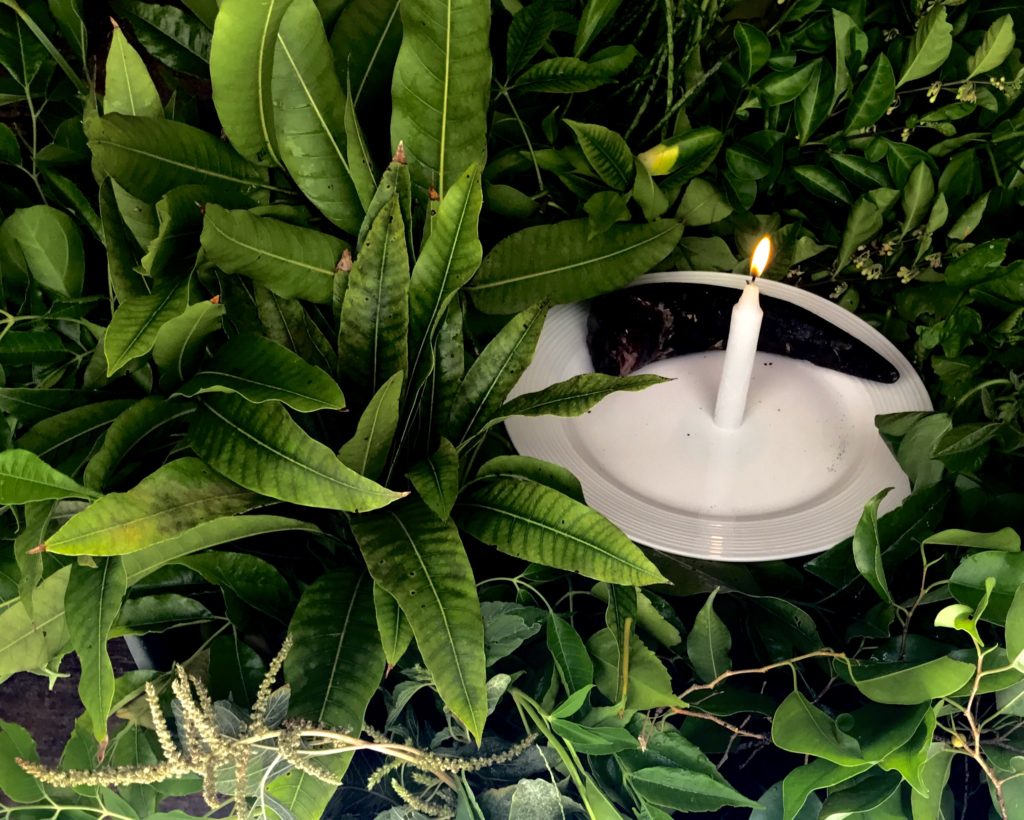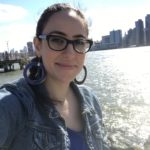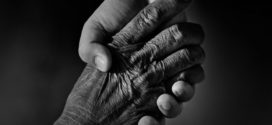 My entire life, I got sick very easily. Always something wrong with my stomach, complaining of nausea constantly. As a kid, tests were run, though my mother made sure we all had a healthy diet, doctors thought I had one illness or another. At around 11 years old, my mother called me into her bedroom. Before I was blindfolded with a red handkerchief, I saw a bowl of fruit and heard the knives. She probably mistook my excitement for fear. “It’s a spiritual cleansing,” she said. Though I didn’t really know what that meant. “Lay down. Don’t open your eyes.” I laughed and lied, said I couldn’t see anything while peeking through the bottom of the blindfold. I could hear movement and see hands; I closed my eyes because I wondered if in keeping them open, something could go wrong. The fruit was passed over my body, collecting whatever I may have had. I imagined the look of stern concentration on my father’s face (he looks like Don Francisco from Sábado Gigante.) My mother, a short, curvy woman with wispy hair, I felt standing by his side, like a nurse assisting a doctor, passing him the requested tools. I had been waiting for this for a long time. I heard the knives banging against each other, at different points, never touching me, as if cutting that energy away. They overpowered the noise of the traffic outside our second floor apartment on the corner of First Avenue where cars went on and off the Queensboro Bridge all day and night. I laid still and wondered what this all meant. It was all done quickly leaving me questioning how much was really accomplished. They asked me to stand up, leave the room, and not look back.
My entire life, I got sick very easily. Always something wrong with my stomach, complaining of nausea constantly. As a kid, tests were run, though my mother made sure we all had a healthy diet, doctors thought I had one illness or another. At around 11 years old, my mother called me into her bedroom. Before I was blindfolded with a red handkerchief, I saw a bowl of fruit and heard the knives. She probably mistook my excitement for fear. “It’s a spiritual cleansing,” she said. Though I didn’t really know what that meant. “Lay down. Don’t open your eyes.” I laughed and lied, said I couldn’t see anything while peeking through the bottom of the blindfold. I could hear movement and see hands; I closed my eyes because I wondered if in keeping them open, something could go wrong. The fruit was passed over my body, collecting whatever I may have had. I imagined the look of stern concentration on my father’s face (he looks like Don Francisco from Sábado Gigante.) My mother, a short, curvy woman with wispy hair, I felt standing by his side, like a nurse assisting a doctor, passing him the requested tools. I had been waiting for this for a long time. I heard the knives banging against each other, at different points, never touching me, as if cutting that energy away. They overpowered the noise of the traffic outside our second floor apartment on the corner of First Avenue where cars went on and off the Queensboro Bridge all day and night. I laid still and wondered what this all meant. It was all done quickly leaving me questioning how much was really accomplished. They asked me to stand up, leave the room, and not look back.
I walked out excited, thinking something along the lines of, “I knew we were into some weird shit.” But my parents would forever tell me to lie. Lying denotes shame.
*
I’m 35 years old and often think back to the santero that ripped me off 20 years ago. An insecure fifteen years old and lonely, I didn’t know him for very long. C was a short Puerto Rican man who reminded me a little of Inigo Montoya from The Princess Bride. Though I had had a padrino already who gave me elekes (there would be several to come and go), my family had grown apart from him so by default, he would no longer be in my life either. The first time I met C, I don’t know what I was looking for. What still stuns me was how badly I wanted to believe in everything he told me. He was a great espiritista that could see what people needed, what they were missing from their lives, but didn’t give you what you paid for. Or lied about what you needed. In my case, it was receiving the orisha Oba. I barely remember buying the sopera, a large porcelain tureen with a floral design on the side, but I remember going to his apartment somewhere near Chelsea in Manhattan. I think of how I walked in with my change of white clothes, my sister-in-law there to help, and cringe. I wish I could tell my fifteen-year-old self, “Just go home!” Though I wouldn’t have listened. Because I went there knowing I shouldn’t be there. I went there knowing I was being lied to. But at 15, I barely listened to my parents let alone my muertos. (Five years later, I was no better at listening.) It wasn’t the money spent that makes me cringe. It’s remembering how embarrassed I was. I think of this often because I see how popular Afro-Cuban religions have become since then and know how easily people can be deceived. How easily we can deceive ourselves when we’re in need or want something. I can appreciate those in the religious community working tirelessly against the desecration of these sacred traditions, but still, I hold a healthy skepticism when it comes to people. I wasn’t deceived because of my age. I was deceived like anyone else can be: people can abuse any position of power. I’ve spent so much time trying to defend myself and my practices, there never felt like there was room for error. You can’t seem to afford mistakes if you’re looking to prove the validity of your beliefs.
It took me a long time to trust myself.
*
On January 2, 2003, I walked into my father’s bedroom while he was watching TV and told him I was getting married. “When?” he asked. “Tomorrow,” I said. My father laughed. I was 20 years old and had the same sense of false confidence that he had. “You know if things don’t work out, you can get a divorce. But it will cost a lot more than going to City Hall to get married,” he said. “I know,” I answered. I think he muted the television when we spoke and turned it back on when I left the room.
I grew up believing that religion was a quick fix. Or at least, my religion was. I felt like I was supposed to know everything. That all of the answers were supposed to come to me. That my struggle was created by negligence, not by destiny.
My father comes from a Cuban family that, for as long as he can remember, practiced espiritismo and communicated with the dead. This was the most natural concept for most of my life. But we grew up much closer to my mother’s Ecuadorian family. I practice Lukumi, am an espiritista and a Palera. But this has meant that I have missed out on family functions, have lied about my reasons for traveling, and have inevitably wondered what it meant to have to present myself in bits and pieces to people. There is a drive and need to be seen as a whole person and sometimes it has felt fake, dishonest to hide parts of myself that are essential to how I see the world. I have learned to simply be discrete in my own way and, if you have a question, I give the answers I’m comfortable with.
Like so many other families, my mother was adamant that we be Catholic and go to Catholic school on the Upper East Side. I didn’t grow up ashamed (though many seeds were planted). The shame came after disclosure. The shame came from being quite proud and innocently sharing and having people give me that look. The look that my eighth-grade teacher gave me when I wore my elekes to school, as she pulled on one from under my white collar and said, “Now, do you really think you need all that?”
Or the look on an ex-boyfriend’s face when, out of desperation because of his cancer diagnosis, I took him for a cleansing. Ok, this look of horror was actually pretty funny in retrospect. It was cancer. I was 19. I was in love. I wanted to do whatever I could to help. It’s not like this was going to cure him, but I thought any little bit of help was good. Even the part afterward where he told me he was definitely not okay with doing anything like that again makes me laugh. What doesn’t make me laugh is what happened after we broke up. When his sister got sick and he wondered aloud to a mutual friend if maybe I had done something to make that happen.
Being embarrassed by something, ashamed in some way, means that you feel your behavior is in some way wrong. And maybe that’s why I struggled for years at a time. Maybe it was because I cared too much about what other people thought, or maybe I relished the day I could live on my own terms (which I could not and in some ways, do not).
For a little while, all I wanted to be, was a certain version of normal.
*
Whenever I remember leaving my first husband, I think of Elegua. I always liked the aesthetic of mine. I liked how the cowrie shells went down the front, how a seashell jutted out from the back of a mound of stone, sitting on a clay dish. I picture the closet I kept him in, next to the cauldron with Oggun. All of my clothes in the way, my constantly reaching in, looking down with guilt; the obligatory weekly service, the offerings, a rarity for years. And of course, this was in a closet, not by my front door the way it should have been. I didn’t want anyone to see and ask questions. I had grown tired of the questions. When my ex and I moved into our second apartment, I can’t even recall where I kept my warriors, orishas I had with me since high school. It wasn’t that I had stopped believing, it was more of a cognitive dissonance. My life, nothing like I thought it would be. I don’t think I was sure of what I believed anymore. Gone was my boveda, all those glasses of water and flowers, I had up since I was barely a teenager. But still, I went for readings and waited to be helped.
A veces uno gana perdiendo. The end of my marriage became the end with the birth of my son. My life hit reset because of an offering I was told to give to Ochun.
*
I met my husband online in 2010. A blanquito from Chattanooga, TN. On one of our first dates, walking around the city in the summer, we ended up inside St. Patrick’s Cathedral. I always loved walking around churches, looking around at the statues of saints, breathing in the smells of old wood and incense. It reminded me of home. It reminded me of the life-size statue of San Lazaro my parents had in their bedroom when I was a little girl. San Lazaro stood in the corner of my parent’s bedroom for years. Leaning on a crutch, holding a staff, sad eyes I used to look up into, candles at his feet, offerings maybe of candy or grains in hope or in thanks that prayers have been answered. Old with sores and the two dogs by his side, looking up at him as well, kind of scared me, but I can picture who I was then: a little skinny girl, short brown curly hair, big eyes, hands on knees looking up fascinated, waiting for something to happen. I used to imagine I could see a tear, wanting to touch the eyes. And here I was again, walking around, looking up at the saints, figuring this was a good opportunity to be clear on where I stood in my beliefs.
My husband never really had an issue with my practices. But there are discomforts we try to be comfortable with. Moments when I remind him of advice received by orishas, taboos and ebos, offerings I need his help with sometimes. It is inevitable that whoever my partner would be, had to be someone who would respect all aspects of me. Because not everyone can respect the privacy and secrecy of ceremonies. And not everyone will be okay with the initiations and time spent away from home.
*
My parents stayed with me for a few days during the holidays. My father is slowly losing his ability to walk and needs spinal surgery. I didn’t want to do it. It opens a door. It’s draining, It’s time-consuming. We still had to drive my parents home, an hour away. I listened though. I gathered a few things I needed; grains, rum, cigar, a red handkerchief and asked my father to come into the room. “Acuestate. Te voy a limpiar.”
*
what about this theory. the fear of not being enough. and the fear of being ‘too much.’ are exactly the same fear. the fear of being you. nayyirah waheed
 Michelle Guerrero Henry is a mother and writer living just outside NYC with her husband and son in an old farmhouse. She is a 2017 VONA alum and 2016-2018 Think Write Publish Fellow focusing on the harmonies between science and religion.
Michelle Guerrero Henry is a mother and writer living just outside NYC with her husband and son in an old farmhouse. She is a 2017 VONA alum and 2016-2018 Think Write Publish Fellow focusing on the harmonies between science and religion.
 Wendy Angulo Productions
Wendy Angulo Productions






